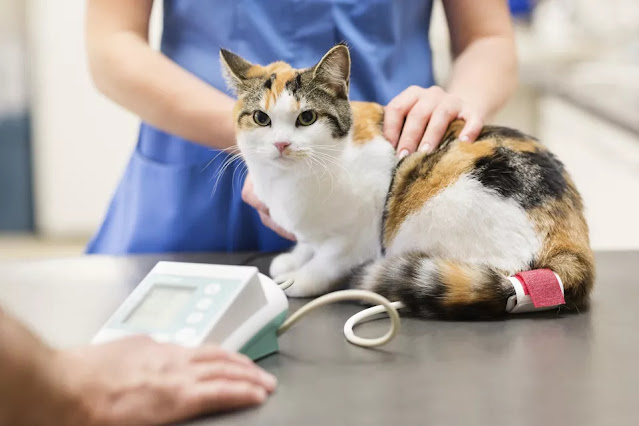Are you concerned that your cat may be losing weight? Unintended weight loss can often be a sign that your cat has an underlying health issue. Senior cats can lose weight, which is often the belief of many owners. If your cat is experiencing weight loss, you must take immediate action.
How to Tell if Your Cat is Losing Weight
If weight loss is gradual, it can be difficult to determine if it is happening. It can be difficult to determine if your cat is losing weight, have a lot of hair, or be slightly overweight.
Start by looking up at your cat's entire body. A tuck at your waist should be visible but not excessive when you are at an ideal weight. Next, move your hands along the sides of your cat. You should feel the ribs with your hands. Your cat may be underweight if the ribs are prominent and visible.
What Causes Cats to Lose Weight?
Cats can lose weight if they don't eat enough. Some diseases can cause weight loss, even though they eat enough. Weight loss can occur with or without other signs and symptoms, depending on the cause. Weight loss in cats can be caused by many health issues, some more severe than others.
Hyperthyroidism
Hyperthyroidism, which is more common in older cats, is quite common. Hyperthyroidism is a condition that causes too high thyroid hormone production in cats. The thyroid gland grows benign tumors that cause this enlargement.
Hyperthyroidism is characterized by weight loss, increased appetite, thirst, and increased urination. Hyperactivity, vomiting, diarrhea, and restlessness are all common symptoms of hyperthyroidism. Hyperthyroidism can cause hair to look unkempt or greasy. Hyperthyroidism can be treated by oral medication or radioactive iodine.
Diabetes
Another common condition that cats can be affected by is diabetes mellitus. This endocrine disorder affects insulin production by the pancreas, which is necessary to regulate blood sugar.
Diabetes symptoms include weight loss, increased appetite and thirst, urination problems, and lethargy.
Insulin and diet changes are the most common ways to manage diabetes. Other vaccinations might be appointed. After several months of treatment, some cats may even return to their normal behavior.
Gastrointestinal Problems
A cat's weight can be affected by any issue in its GI tract. GI issues can cause a cat to lose appetite. Second, some issues can prevent the GI tract from properly digesting food. This can lead to weight loss. Cats can have GI issues such as intestinal parasites and inflammatory bowel disease.
Gingivitis can cause weight loss, nausea, vomiting, diarrhea, lethargy, and other symptoms. The treatment of GI parasites can be as easy as deworming your cat. Other GI problems may require medication and support care.
Dental Problems
Extreme pain can result from dental and oral tissues, leading to decreased appetite and weight loss. Periodontal disease, tooth fractures, and resorptive lesions are all common dental issues in cats.
Bad breath, drooling, and pawing at your mouth are all signs of dental problems.5 Your vet will first administer anesthesia to your cat and then perform a professional cleaning, exam, and treatment as needed. Some cats may need to have their teeth extracted or oral surgery performed.
Cancer
Like humans, cats can also get cancer anywhere they go. Sometimes, cancer may appear as a tumor. Lymphoma is the most common type of cancer found in cats. It can spread to the GI tract, mouth, and lymphatic system. The majority of forms of cancer can eventually lead to general malaise and lethargy and muscle wasting, weight loss, and general malaise.
Stress
Cats can feel very sensitive when there are changes in their environment. They are skilled at hiding stress signs so that they don't become more noticeable later. Cats can experience anxiety and stress from any environment. An indicator of stress is decreased appetite, which can lead to weight loss.
A variety of health conditions can cause weight loss. Other signs and symptoms may be present if your cat is suffering from an underlying illness. You should also consult a veterinarian to confirm that your cat is suffering from a similar illness.
Treatment for Weight Loss in Cats
It all depends on what is causing the weight loss in your cat. Your first step in addressing weight loss in cats is to make an appointment with a veterinarian. The first thing your vet will do is perform a physical exam. To determine the problem, you may need to have lab tests or X-rays. Based on these findings, your vet may recommend medication or diet changes, surgery, and other treatments.
If your vet gives you a clean bill, your cat may have lost weight due to insufficient food intake or an unknown condition. Ask your vet for information about nutrition and enrichment. Start by identifying the source of stress in your cat. Your veterinarian can recommend a diet high in nutrients and calories that could aid your cat's weight gain.
Your vet should be communicated if your cat's weight loss persists despite any changes made. You may be referred to a specialist veterinary surgeon by your vet for more advanced diagnostics.
How to Prevent Weight Loss in Cats
Weight loss can be prevented by keeping your cat in good health. Regularly check the condition of your cat and make sure to visit the vet for regular wellness examinations. Your vet may be able to detect problems before they become serious. Cats are great at hiding injuries and illnesses. Your vet should be notified immediately if your cat exhibits unusual behavior. It is easier to diagnose a problem early on than wait to see if your cat becomes seriously ill.

